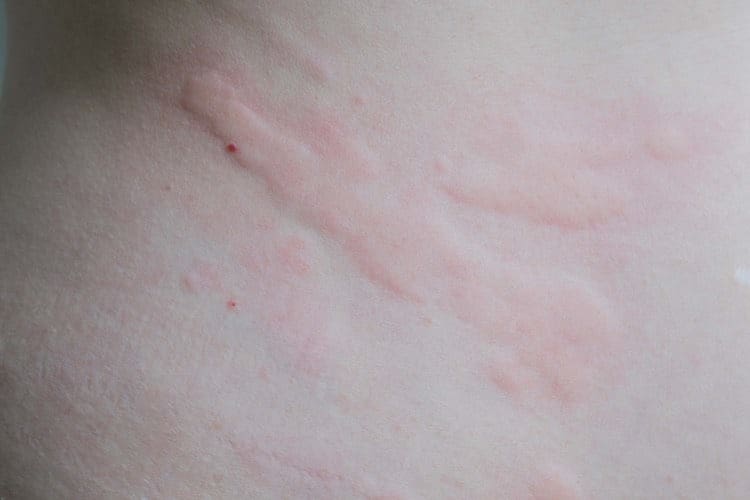- General Information
- See Your Pharmacist or Medical Professional
- Treatment Tips
- Treatment Options
- More Information
General Information
Urticaria is a skin reaction that can appear as an itchy, red rash anywhere on your body. It is characterised by wheals (hives) which are red, raised, swollen patches of skin. Urticaria can be short-lived (24 to 48 hours) or can last longer.
Urticaria can be caused by an allergic or non-allergic reaction. Some people may have an allergic reaction to drugs, food (e.g. shellfish or nuts), preservatives or insect bites. Other people may have a non-allergic reaction to food, food additives or medicines.
Urticaria can also be caused by infection (e.g. sinusitis) or heat, cold, or pressure from elastic in clothing. However, the cause of urticaria is not always identified.
Symptoms of urticaria
- wheals are itchy, raised and swollen and can appear anywhere on your body
- wheals can be small or large, be different shapes, or they can change shape
- wheals can last for hours or days
- heat or stress, such as emotional upset, may worsen urticaria
- other symptoms, such as fever or swelling on the lips, eyelids, tongue, and throat may be present and require medical attention
See Your Pharmacist or Medical Professional
Seek medical advice urgently if you have any of the following symptoms:
- marked swelling, especially in the face, eyes, lips or tongue
- wheezing, tight chest or difficulty breathing or swallowing
See your pharmacist or medical professional if:
- urticaria lasts longer than 24 to 48 hours
- urticaria comes back after treatment
- urticaria covers a large area of your body
- you have fever or feel generally unwell
- urticaria does not respond to treatment, such as an oral antihistamine product
- the person with urticaria is a child aged under 12 or is elderly
- you are pregnant or breastfeeding; some medicines may not be suitable
- you have other medical conditions, such as asthma or eczema, or take other medicines
- you have allergies to any medicines or have started taking a new medicine
Treatment Tips
- try to identify what triggered the urticaria, such as a food or medicine, and avoid it if possible
- if you have a severe reaction, you may need to carry an EpiPen or EpiPen Jr (PHARMACIST ONLY products) and wear a medical alert bracelet (such as Medic-Alert); ask your doctor or pharmacist for more information
- if aspirin appears to trigger urticaria, see a doctor before using any other medicine, such as non-steroidal anti-inflammatory drugs (NSAIDs)
- a cool or tepid (slightly warm) shower may be soothing to the rash, but heat may make the itch worse
- avoid tight clothes, as pressure may worsen the wheals and itch
- cool, moist compresses and moisturising creams, such as aqueous cream, can soothe a rash
- in severe cases, a skin prick test may be needed, or allergy immunotherapy for desensitisation may be needed
Treatment Options
Oral antihistamines
- urticaria is caused by the release of histamine in your body
- individual responses to treatment vary so it is important to try a number of options if one treatment does not work
- antihistamines block the action of histamine and relieve itching. There are two main types of antihistamine:
- older sedating antihistamines that cause drowsiness
- newer, non-sedating antihistamines that do not typically cause drowsiness
Older sedating antihistamines
[PHARMACIST ONLY]
e.g. dexchlorpheniramine (Polaramine), promethazine (Phenergan, Sandoz Fenezal)
- these products may help if itching is severe and interferes with your sleep
- these products may cause drowsiness, sometimes the next day, so it is important you do not drive or operate machinery, and that you avoid alcohol
- these products should not be used in infants under two years old; check product directions for other age groups
- sedating antihistamines are not suitable for everyone; check with your pharmacist
- if you have other medical conditions, such as glaucoma, epilepsy or prostate problems, or you take antidepressants, check with your pharmacist before taking
Newer non-sedating antihistamines
[PHARMACY ONLY]
e.g. cetirizine (Zilarex, Zyrtec), desloratadine (Aerius), fexofenadine (Fexotabs, Telfast), loratadine (Claratyne, Lorano, Lorapaed)
- these can help relieve total body itchiness and redness
- non-sedating antihistamines may rarely cause drowsiness; do not drive or operate machinery if you are affected
Anti-itch and healing/soothing preparations
[GENERAL SALE]
e.g. Calamine Lotion, Eurax, Pinetarsol, SoloSite Gel
- these products soothe skin irritations and promote healing
- tar products help relieve skin itching but can discolour clothes
- calamine lotion has a soothing, cooling effect but it may dry skin, so avoid it if you have eczema and use a moisturising cream. An alternative option that is not drying to the skin is SoloSite Gel
Topical menthol 0.5–1% in aqueous cream
[PHARMACIST ONLY]
- this cream is moisturising and can have a cooling, soothing effect
Urticaria due to heat rash or sweating
[GENERAL SALE]
e.g. 3B Action Cream, Sudocrem
- contains an antiperspirant in an emollient base to prevent (not treat) chafing and urticaria from heat rash and sweating
More Information
Availability of medicines
- GENERAL SALE available through pharmacies and possibly other retail outlets.
- PHARMACY ONLY available for sale through pharmacies only.
- PHARMACIST ONLY may only be sold by a pharmacist.

